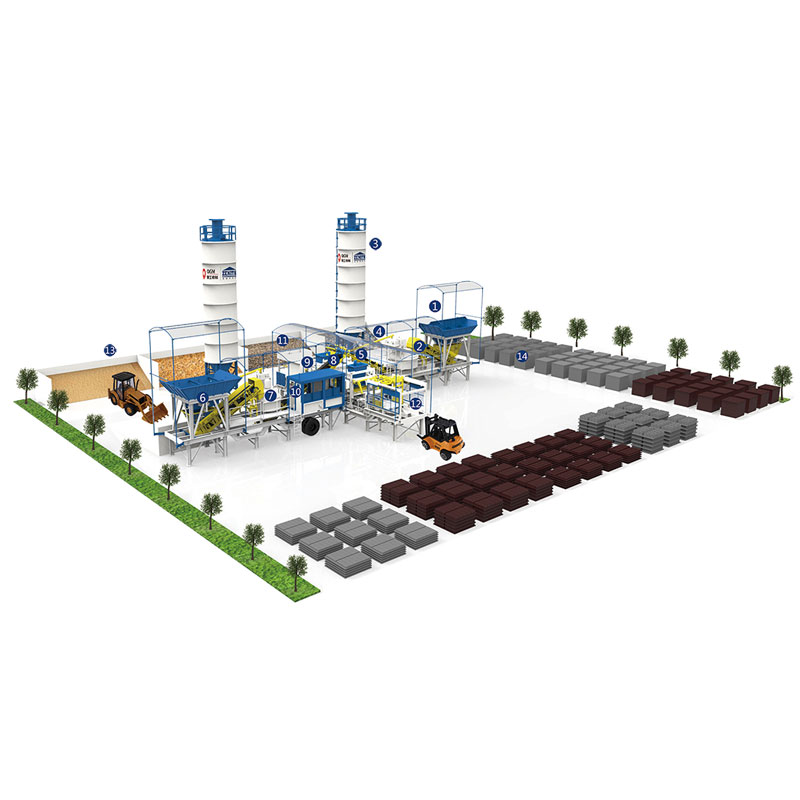The Future of Construction: Exploring the Benefits of a Mobile Block Production Line
2024-09-18
In the fast-evolving construction industry, efficiency and adaptability are key to meeting the growing demand for infrastructure and housing. One of the most innovative solutions addressing these challenges is the mobile block production line. Unlike traditional stationary block production equipment, a mobile block production line brings flexibility and cost-effectiveness by enabling on-site manufacturing of concrete blocks. This innovation is revolutionizing the way construction projects are executed, especially in remote areas or regions with limited access to industrial manufacturing facilities.
In this blog, we’ll explore what a mobile block production line is, its key benefits, and how it is shaping the future of construction.
What is a Mobile Block Production Line?
A mobile block production line is a fully integrated system designed to manufacture concrete blocks and other building materials directly at the construction site. This portable system includes all the necessary components, such as a block-making machine, conveyor, mixer, and curing system. It operates in a compact, mobile unit that can be easily transported from one location to another, allowing construction teams to produce high-quality blocks wherever they are needed.
The production process typically involves mixing raw materials like cement, sand, gravel, and water in precise proportions, which are then compressed and molded into blocks. The blocks are then cured and ready to be used in various construction applications, including walls, pavements, and foundations.
Key Benefits of a Mobile Block Production Line
1. Cost Savings
One of the most significant advantages of using a mobile block production line is the cost savings it offers. By producing blocks directly on-site, construction companies can significantly reduce transportation costs associated with shipping pre-manufactured blocks from external suppliers. Additionally, producing blocks locally helps minimize wastage and the costs of handling excess materials.
For large construction projects or those in remote locations, these savings can be substantial, contributing to a more streamlined and economical building process.
2. Increased Efficiency and Speed
With a mobile block production line, blocks can be produced on-demand and in the quantities required by the project. This eliminates waiting times typically associated with ordering and delivering pre-made blocks from a factory. By having immediate access to building materials on-site, construction teams can work continuously, improving the overall speed and efficiency of the project.
The on-site production also allows for greater flexibility in scheduling, as block manufacturing can be adjusted to match the project’s specific timeline and requirements.
3. Adaptability to Remote and Challenging Locations
Mobile block production lines are particularly useful in remote or difficult-to-access locations, such as rural areas or regions with underdeveloped infrastructure. Traditional block suppliers may not be easily accessible in such locations, making on-site block production a practical and viable solution. The mobility of the production line allows it to be transported to areas where block availability is limited or nonexistent, ensuring that construction projects can continue without delays.
This adaptability also makes mobile block production lines ideal for disaster relief and emergency construction projects, where time-sensitive responses are critical.
4. Customization and Quality Control
Producing blocks on-site allows for greater customization in terms of block size, shape, and composition. Construction teams can tailor the block production process to meet the specific needs of the project, whether it’s creating stronger, more durable blocks for load-bearing walls or producing lighter blocks for non-structural elements.
Moreover, on-site production ensures quality control, as construction teams can oversee every step of the process, from mixing raw materials to curing the blocks. This hands-on approach guarantees that the blocks meet the desired specifications and are of high quality.
5. Environmental Benefits
Using a mobile block production line contributes to a sustainable construction process. Since the blocks are produced on-site, there is no need for long-distance transportation, which helps reduce carbon emissions. Additionally, the use of local raw materials can minimize environmental impact by reducing the reliance on externally sourced resources.
Many mobile block production lines are also designed to optimize material usage, ensuring minimal waste and efficient use of resources, further enhancing the eco-friendliness of the construction process.
How Does a Mobile Block Production Line Work?
The operation of a mobile block production line involves several key steps, all of which are carried out using a compact, transportable system. Here’s a breakdown of the typical process:
1. Raw Material Preparation: The first step involves gathering the necessary materials, such as cement, sand, aggregate, and water. These materials are then loaded into the system’s mixing unit.
2. Mixing Process: The mobile unit includes a mixer that combines the raw materials into a homogeneous mixture, ensuring the proper consistency and quality required for block production.
3. Molding and Pressing: The mixed material is transferred to the block-making machine, where it is poured into molds. The machine compresses the material, forming blocks of the desired size and shape.
4. Curing: After the blocks are formed, they undergo a curing process to strengthen and harden them. Some mobile production lines come equipped with curing chambers, while others rely on natural curing methods, depending on environmental conditions.
5. Storage and Use: Once the blocks are fully cured, they are ready to be used in construction. The blocks can be stored on-site or transported to different areas of the project as needed.
Applications of Mobile Block Production Lines
Mobile block production lines are suitable for a wide range of construction projects. Some of the most common applications include:
- Residential Housing: On-site block production can significantly reduce costs and improve efficiency for residential housing projects, especially in areas where construction materials are scarce.
- Commercial and Industrial Buildings: Large-scale commercial and industrial projects can benefit from the flexibility and cost savings offered by mobile block production.
- Infrastructure Development: Whether it’s roads, bridges, or public facilities, mobile block production lines can be instrumental in providing the necessary materials for infrastructure projects.
- Disaster Relief and Emergency Housing: In the aftermath of natural disasters, mobile block production lines can be deployed quickly to produce blocks for emergency shelters and infrastructure repair.
Conclusion
The mobile block production line represents a groundbreaking advancement in the construction industry, providing a practical solution for on-site manufacturing of concrete blocks. With its numerous advantages, including cost savings, increased efficiency, and adaptability to remote locations, mobile block production lines are helping construction teams deliver projects faster and more economically.
As the demand for flexible and sustainable building solutions continues to grow, the mobile block production line will undoubtedly play a key role in the future of construction. Whether you’re a contractor working in a remote area or a developer looking for ways to streamline your project, investing in mobile block production technology can offer significant long-term benefits.



